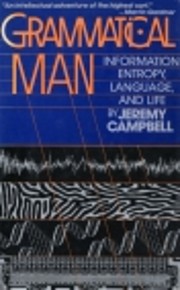

Klik op een omslag om naar Google Boeken te gaan.
|
Bezig met laden... Homo grammaticus : de informatietheorie als de grammatica van de natuur (1982)door Jeremy Campbell

Bezig met laden...
Meld je aan bij LibraryThing om erachter te komen of je dit boek goed zult vinden. Op dit moment geen Discussie gesprekken over dit boek.   ) )"Grammatical man" is a gentle peep into the world of information theory for the general reader with little or no background in mathematics. It explains how come we live in a more and more complex world despite the physical laws of entropy, and how information theoretical forces may be at play in our DNA and in evolution. My personal reason for reading this book was I had developed an interest in the area as a linguist/philosopher who have used it in connection with work in Statistical Machine Translation, and hoped this book might throw some light on why crude mathematical methods sometimes give better results than more theoretical linguistically pure. So I was disappointed that the author, in linguistics, had "sold his soul" to Noam Chomskys theory of linguistics, which I believe runs counter some of the strengths of information theory with its strong dependence on innateness and poverty of stimulus. But the non-linguistic reader will probably not notice this. geen besprekingen | voeg een bespreking toe
Erelijsten
Just as physics made sense out of the mysteries of earth, air, fire, and water, it can be said that the science of information enriches and unifies an amazing diversity of modern sciences, from physics and mathematics to biology and linguistics. Because symbols, messages, and codes are the stuff not only of computers and telecommunications, but also of living organisms and the forms of human knowledge, information, and thus information theory, is universal. This is the first book to tell the story of information theory, how it arose with the development of radar during World War II, and how it evolved. This thought-provoking book describes how the laws and discoveries of information theory support controversial revisions to Darwinian evolution, begin to unravel the mysteries of language, memory and dreams, and stimulate provocative ideas in psychology, philosophy, art, music, computers, and even the structure of society. The insights of information theory make us look at our world in an entirely new and different way--but perhaps its most fascinating and unexpected surprise is the suggestion that order and complexity may be as natural as disorder and disorganization.--From publisher description. Geen bibliotheekbeschrijvingen gevonden. |
Actuele discussiesGeenPopulaire omslagen
 Google Books — Bezig met laden... Google Books — Bezig met laden...GenresDewey Decimale Classificatie (DDC)001.539Information Computing and Information Knowledge [formerly : Cybernetics & related disciplines] [formerly : Information & communication] [formerly : Cybernetics] [formerly : Information theory]LC-classificatieWaarderingGemiddelde: (3.96) (3.96)
Ben jij dit?Word een LibraryThing Auteur. |
||||||||||||||||||||||||||||||||||||||||||||||||||||||||||||||||||||||||||||||||||||||||||||||||||||||||||||||||||||||||